The out of body girl: My fragmented life with dissociation
It has taken time and practice to integrate my body and my mind, to ask them to live side by side.
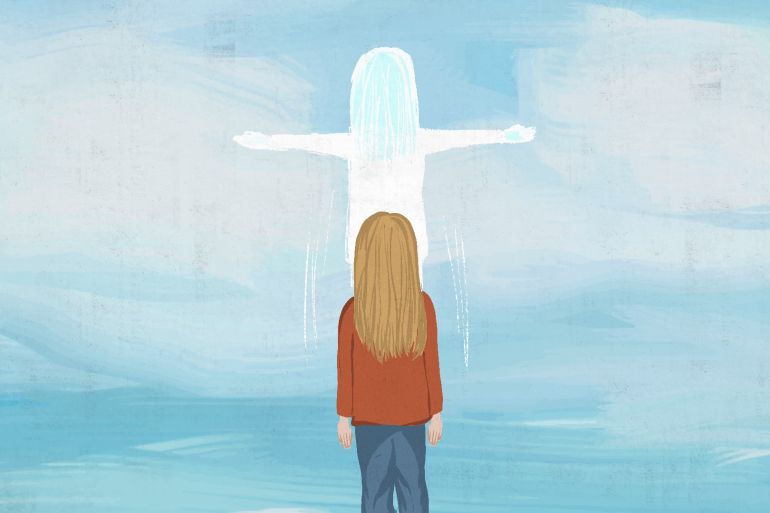
Listen to this story:
This article contains accounts of sexual assault that some readers may find disturbing or triggering.
Keep reading
list of 4 itemsThe price of the false or non-apology
Five steps to leaving an abusive relationship
The evening death came for me: My journey with PTSD
Confusion
Light shines through the half-opened blinds. Baby powder fills the air. The door is locked.
You see her down there on the bed. You see her eyes and mouth wide open. You see the big boy with one hand under her dress. She looks solid as cement. Hands straight at her sides. You tell her to move. You shout at her to kick, to scream. You yell at her to get up, get out of there. When she doesn’t move, you look outside. You are high in the air, just below the ceiling. You see your sister and brother playing on the backyard swings. You see the purple lilacs and the frog-shaped sandbox. You hear a door slam and then you are standing in front of a mirror.
I did not recognise the girl in the mirror. I stared at her wondering why she had not done what I asked. I had seen her on the bed below me. She wore the same red dress I had on. I shook my head hard. Maybe it was a dream. But what had happened still did not make sense. I watched in the mirror as I zipped the dress up to my neck. I walked back to the bed, but I was wobbly. Something did not feel right. Everything was in slow motion. I looked down. My patent leather shoes were on my feet. I still had two arms and two hands. I touched my wrist. I could feel the cold skin. A black and white movie played on TV. I knew I was at the new babysitter’s house on Blueberry Lane. But who was that boy? My body shook. I knew my name was Joyce. I knew I was seven years old. I knew I had lost something, but I had no idea what.
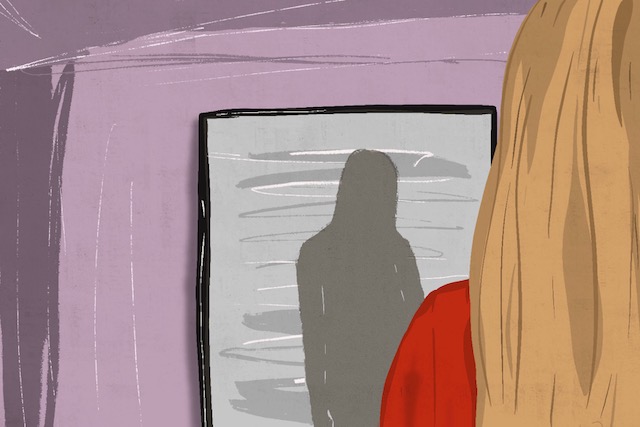
Silence
Several hours later, we were all watching The Wonderful World of Disney. The babysitter shouted she would “crack somebody’s ass” if we all were not quiet. Eventually, my parents retrieved me and my siblings. Even though we had all been yelled at by the babysitter, and even though the woman had spanked my younger brother, even though a strange boy had unzipped my red church dress, on the car ride home in the dark, when asked how the day had gone, all I could say was the food was terrible. That made everyone laugh. While my parents and siblings continued to talk, I turned my body to look out the back window of the car. I counted stars. The moon hung low, but never said a word. I could make no sense of how or if I had been in two places at once. I had no sense of what the teenage boy had done to me. I knew something bad had happened. I knew in my core that even if I knew how, I could not tell anyone. Even then, I knew something inside me would never be the same.
Guilt
Ammonia wafts through the room. The walls are a dull green. Everything else is white.
You look down and see the top of the family doctor’s head: mostly bald but with a few grey splotches of hair. A pipe hangs from his lip. You cannot hear him, but he is speaking to you. One hand is on your not yet developed breast, the other inside you. You do not want him doing that. You look down and watch as you on the examining table squeeze your eyes shut. You see your rigid body, arms tight against your sides. You down there look like a corpse you have seen while watching Monster Movie Matinee on Saturday afternoons in your basement. The doctor’s body is swaying, his hands are moving in ways that make you cringe. On the ceiling you turn to avert your eyes. Looking down you can see your mother in the waiting room, a magazine in her hands. You focus on that. Is it Good Housekeeping? Family Circle? Redbook? How did you get up here? When will he stop? Why is your mother not with you? Why are you not yelling for help? Why are you allowing this to happen?
The doctor led me back to the waiting room, after giving me a lollipop and watching me dress. When my mother asked how I was doing, the doctor told her everything was in order. “Isn’t it?” he said, smiling with his hands firmly pressed on my shoulders.
I was 11 years old. I was well aware that my family doctor had scared me half to death with his touch, scared me out of my body and onto the ceiling. “What did I do,” I asked myself over and over as my mother drove us past Camillus Plaza and the high school. What had I done to make him touch me like that? Did I look into his eyes too many times? Did I smile too much? My skin slithered and crawled all the way home, all the way into the next day. A shower could not wash away the scum I felt covering my body. I started walking with my head down. I stopped looking people in the eye. I tried to make myself invisible so no one would see me.
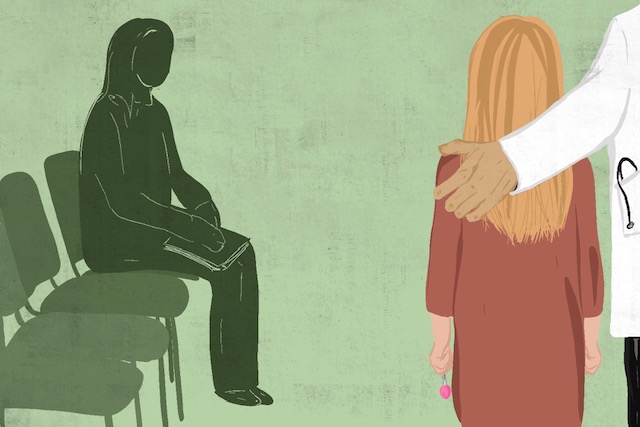
Relief
It is dark outside. The stereo is blaring. The dog paces and pants.
You are lifted in the air then thrown against the wall. You are lifted in the air then thrown against the door. Then the wall again. This time a mirror falls to the floor and cracks. The rug is covered with sharp shards. Looking down from your perch on the ceiling, you see your cheek fill one piece of shattered glass. Your bleeding lip fills another. Your tangled blonde hair tangles in a larger fragment of mirror. You are shocked at your boyfriend’s red face. The anger that spews off him like steam from a teapot. You can tell he is shouting but you are not able to hear. You hear a faraway roaring like an ocean or a train. You hang mid-air, the only safe place to be. You’ve been here before. You know this place well. The ceiling is home for you. It’s comfort for you. It’s like floating in a pool, this suspension from gravity.
I was 27 years old. I was so used to segments of time out of body that I was no longer frightened or confused on the ceiling. I was grateful for being up there. I still had no idea how it happened; I couldn’t consciously force myself to leave my body. The fear lived in the before and after. When my boyfriend became angry and violent, I became so frightened, I froze. I stood paralysed hoping he would calm down, leave the room. When he did not, when he shook me or hit me or threw me against walls, my mind knew to separate from the flesh. By now I knew that I was both the girl being hurt and the girl on the ceiling. I didn’t yell in my mind to the girl on the floor. I knew I would be back in her shoes, her throbbing bruises and bloody cuts soon enough. This is when I began to identify with the girl on the ceiling or, as I came to call myself, “the out of body girl”.
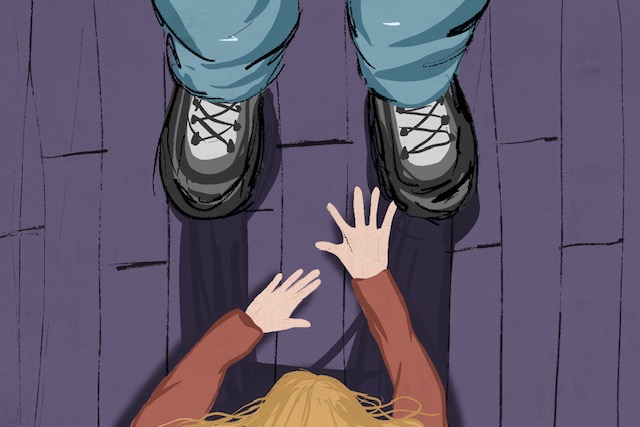
Disruption
It’s instantaneous. It’s a jolt. It’s fast. It’s furious. It’s a loud slam like bones being crushed. Like two tall trees trying to merge in a hurricane. Like dropping a cement block from a 50-storey building.
Re-entering the body doesn’t hurt. Once the world has settled again, once I feel my blood stop racing through my veins, I ask myself what happened? And always: What did I do? How did I cause this? That question never went away.
When I am back in body; when I am no longer hyperventilating, I usually try to stand up. My limbs are numb as if my whole body has been injected with Novocain and it is beginning to wear off. I am unsteady on my feet as if intoxicated. I am extremely tired. Humming helps. Sitting with my head down helps. Eating a small amount of solid food helps. What does not work is engaging with other people. I’ve always needed time to slow down, to breathe, and to stare at my feet on solid ground, to remind myself I am still in this world.
Shame
Your uncle is behind you. He snuck up again out of nowhere. His hands are inside your shorts. The main door to the cabin slams. Your father coughs. Oh no, oh no, oh no. If he sees you, he will hate you. If he finds you here like this, he will blame you.
This was the only time I was capable of interrupting a traumatic encounter. I did not do it for me. I was always too paralysed to act on my own behalf. But the summer I was 13, our family rented a cabin on a lake in Central New York State. Everyone was outside except for me. I was looking for my swimsuit. My uncle slid silently into the room and grabbed me. Then I heard my father enter the cabin. I could not be caught like that. I would never be able to look my father in the eye again. I had already created a suicide plan in response to all the abuse from this uncle. If my father saw me, I would not be able to live. For the first time, I pushed away from my uncle as hard as I could. I flew out the cabin door. My mother and grandmother sitting at the picnic table saw me wide-eyed and frantic. They laughed and asked what was wrong. Every cell in my body vibrated. I could not form words, so I ran. I ran through the woods as fast I could. I ran down the hill and crossed the road. I ran through the swing sets and when I got to the lake, I dove in headfirst with all my clothes on. I swam past the safety ropes and turned onto my back. I floated there all afternoon, trying to keep my eyes open, trying to burn the shame from my skin.
Grief
A few years ago, I was living in Questa, New Mexico. I thought my “out of body days” were over. Then one Saturday, my sister called to tell me our mother had died. She was 93 but healthy so it was very unexpected, especially since I had spoken to her two days before. The following morning, I sat on my bed drinking coffee and writing which was my usual morning ritual. I went to lift my coffee cup and realised I was on the ceiling looking down at the top of my head. My hand reached for the mug of coffee. Tarot cards sat on top of a lined notebook. The world started spinning a bit and then I was back on the bed, my hips on the mattress, my toes sticking out of the blanket.
This time, I knew what to do. I dressed and grabbed my car keys. I stomped my feet on the floor. I held onto the kitchen table. I made sure I was connected to the physical objects in my house. I drove The Enchanted Circle that day. The road led me through Red River, Eagle Nest, and Taos. I white-knuckled the steering wheel. I slammed my feet into the car floor. I chanted over and over: Stay here. Stay here. And it worked the same way it had worked years before on the day I left my abuser. Hold on, feel your feet on the ground and chant long and loud.
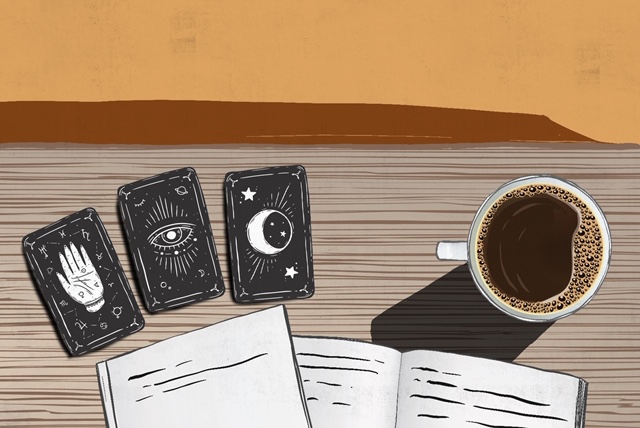
Validation
The night air is warm. Pinon drifts in through the window. Soft light brightens the corners.
You’re lying on the thick carpeted floor of a therapist’s office. She pushes on your chest. “Breathe in a circular motion,” she says. You nearly hyperventilate and then you’re inside a family photograph. You are reliving the day you learned what dead meant. You are 10 years old and your friend Laurie Gates has just asked you and your mother who the little baby boy is in the picture on the wall. You know it is the brother you never met. But it’s your mother who has to explain that he died when he was nine. He died when he was younger than you. And you’re on the ceiling again and you see Laurie and you see your mother. And you know now you will never see your brother. You know now he has not just gone somewhere. He’s gone for good. He’s gone forever.
I never told anyone about my out of body experiences until I began seeing a therapist in Santa Fe shortly after leaving my abuser. I had done a Transformational Breathwork session with her and in the process, I felt safe enough to explain to her how I had separated from my body during traumatic situations ever since I was seven years old. She told me that my coping mechanism was creative, that it saved me, and that I was not the only person who dealt with trauma by separating from the body. For the first time, I felt seen. I slowly began to imagine that I could begin to look people in the eye again and to move through the world without my constant hyper-vigilant perspective. I began to see that anything I wanted was possible.
Control
For me, the answer to preventing dissociation always came down to keeping myself away from circumstances that would trigger an out-of-body experience. It was all or nothing for me. I was not able to stop traumatic situations once they started. Instead, I had to prevent the possibility to the best of my ability. Once I dissociate, I don’t know how to set in motion getting back into the body. In general, I cannot will myself to do it. The process happens on its own. So, what I learned to do over time was to consciously choose not to be in an unsafe situation. I knew even as a kid that I could only control that to a limited extent. I stopped going to my uncle’s house. I told my parents I had babysitting jobs and I stayed home. As an adult, I had to permanently leave my abuser because his behaviour was never going to change. I miss out on certain opportunities as a result. I no longer attend literary or musical events at night if I have to go alone. I refuse to park in parking garages. Even though I live at the end of a dirt road in the woods, if I have left something in my car at night, I wait until morning to retrieve it. I realise some of my decisions are fear-based. I am willing to pay that price for my safety.
Witness
There are a few different types of Dissociative Disorder. For the most part, my experience was as an “outside” observer, watching myself in traumatic situations as if I was viewing a movie from above and outside my body.
That I am still walking in this world, that I didn’t reach permanently for the razor blade, the rope, or the bullet is amazing to me. My life in fragments was one of self-witness, a long process of laying broken pieces together side by side, like squares in a quilt, to create a whole being.
What I really want to say is that for so many years I could not see this future that I live now in the present. Even amid a pandemic, I love the life I’ve created. I teach; I write; I make art; I visit loved ones. I dream again of travelling to Montana and Wyoming. To London and Paris. I am alone a lot by choice, but I am not lonely. It can take a lifetime of gathering the shards of a self together, of making connections with family, friends, and practitioners. With age and grounding techniques, I am now more aware and able to intervene on my own behalf in ways I never could as a child or a young adult, or even a woman in my 30s. It has taken time and practice to integrate my body and my mind, to ask them to live side by side, these two entities that for so long looked upon each other with disgust. These two entities that have learned to respect and honour each other’s strengths and abilities, grounded to the earth.
If you or someone you know needs help with Dissociation or another mental health issue, these organisations may be able to help.